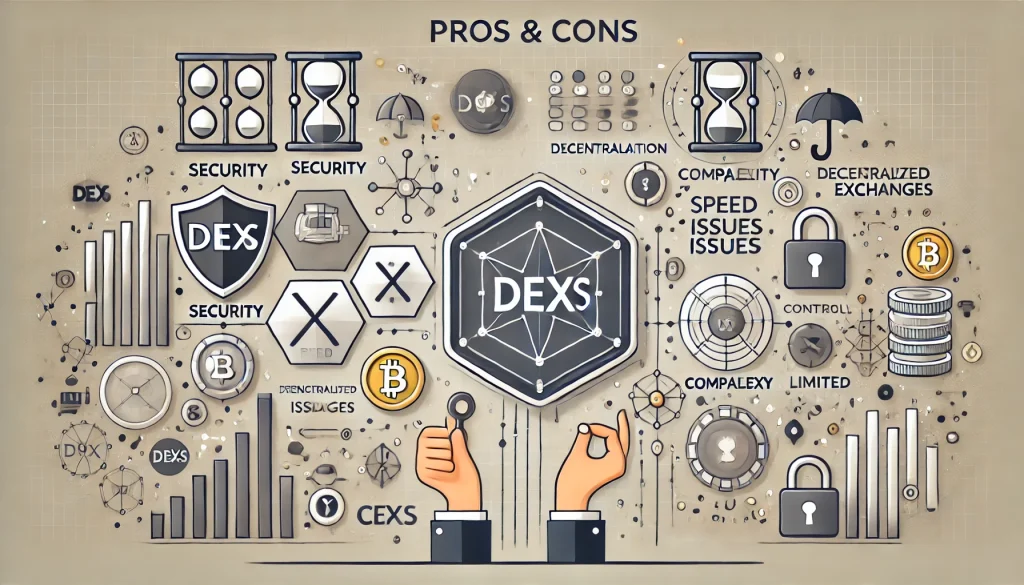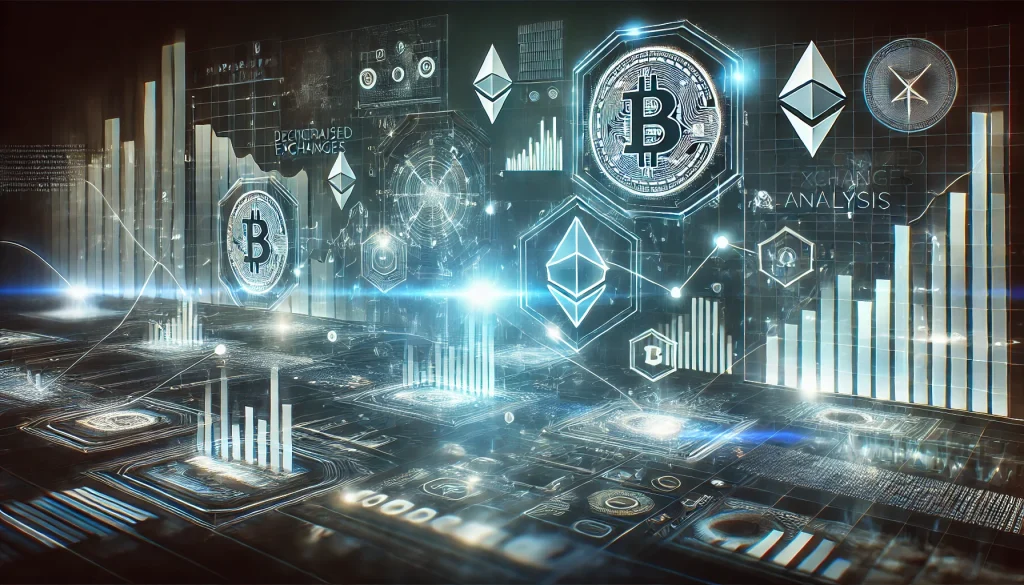Introduction

Decentralized exchanges (DEXs) are gaining significant traction in the cryptocurrency world, and for good reason. These platforms allow users to trade cryptocurrencies without relying on a centralized authority, increasing both security and transparency. As the crypto market continues to evolve, understanding the benefits and limitations of decentralized exchanges is crucial for anyone looking to trade crypto safely. In this review, we’ll take a closer look at the key features, pros and cons, and overall performance of decentralized exchanges to help you navigate the crypto landscape in 2024.
Overview
Decentralized exchanges operate on blockchain technology and enable peer-to-peer trading without intermediaries. Unlike centralized exchanges, DEXs do not require users to transfer assets to a third party, reducing the risk of hacking and fraud. Popular DEXs include Uniswap, SushiSwap, and PancakeSwap, each offering unique features such as automated market making (AMM), liquidity pools, and token swaps. With growing concerns about data privacy and control, DEXs are emerging as the preferred choice for many crypto traders who want to maintain ownership of their assets and trade securely.
Pros and cons

Pros
- Increased security: Decentralized exchanges don’t hold user funds, which significantly reduces the risk of large-scale hacks.
- Transparency: All transactions on the DEX are recorded on the blockchain, ensuring complete transparency.
- Anonymity: Users can transact without having to go through extensive know-your-customer (KYC) procedures.
- No censorship: Because it operates on a decentralized network, it’s less subject to government regulation or censorship.
Cons
- Liquidity issues: Some decentralized exchanges may experience slippage due to lower liquidity compared to centralized exchanges.
- User experience: The interface of many decentralized exchanges can be complicated for beginners, lacking the user-friendliness of centralized platforms.
- Limited trading pairs: Decentralized exchanges may have a small number of trading pairs, limiting the options for users looking for a specific token.
- Potential for high fees: Depending on network congestion, transaction fees can be high, especially on Ethereum-based platforms.
Deep dive analytics

Design
Decentralized exchanges are designed with user privacy and security at their core, but the user interface often takes a backseat. Platforms like Uniswap have made strides in improving their UX/UI, but they still lag behind centralized platforms in terms of intuitiveness. Many decentralized exchanges prioritize function over form, making them more suitable for experienced traders than novice traders.
Features
Functionality varies widely across exchanges. For example, Uniswap and SushiSwap use automated market-making algorithms to ensure smooth trading. PancakeSwap, which operates on the Binance Smart Chain, offers low fees and fast transaction times, making it an attractive option for traders dissatisfied with Ethereum’s gas fees. Despite these innovations, the lack of customer support for decentralized exchanges can be a major drawback for users facing issues.
Performance
Performance is generally strong, and transactions are processed quickly, especially on platforms that use layer 2 solutions or alternative blockchains such as Binance Smart Chain. However, performance can degrade when the network is congested, especially on Ethereum-based decentralized exchanges. Users should also be aware that while decentralized exchanges offer improved security, they are not immune to bugs and smart contract vulnerabilities, which can result in losses.
Security
Security is one of the strongest advantages of DEXs. Decentralized exchanges don’t require a centralized authority to hold funds, which greatly reduces the risk of large-scale hacks. However, with this security comes the responsibility of managing private keys. If a user loses access to their keys, they also lose access to their funds, and there’s no remedy for that.
Compare
When comparing decentralized exchanges to centralized exchanges (CEXs) like Binance or Coinbase, the biggest differences are in security, control, and user experience. DEXs offer superior security and privacy, while CEXs offer better liquidity, a more comprehensive range of trading pairs, and superior customer support. CEXs are generally more accessible to beginners, with simpler interfaces and more educational resources. However, they have the disadvantage of having to entrust your funds to a third party, which carries potential security risks.
| Features | Decentralized exchanges (DEXs) | Centralized exchange (CEX) |
|---|---|---|
| Security | High | Normal |
| User experience | Normal | High |
| Liquidity | Low-Medium | High |
| Privacy | High | Low-Medium |
| Asset control | User control | Exchange controls |
Conclusion
Decentralized exchanges offer an attractive alternative to centralized platforms, especially for those who prioritize security, privacy, and asset control. While there are challenges, including liquidity issues and a steep learning curve, the benefits of using decentralized exchanges in 2024 are clear. For seasoned crypto traders who value security above all else, decentralized exchanges are an excellent choice, but for beginners, centralized exchanges may still be more user-friendly and accessible. Overall, decentralized exchanges are a powerful tool in the cryptocurrency ecosystem, but they are best suited for those who understand the risks and rewards.
Rating
4/5 – A strong choice for secure, private crypto transactions, with room to improve the user experience.
FAQ
What is a decentralized exchange?
A decentralized exchange (DEX) is a platform that allows peer-to-peer cryptocurrency trading without a central authority.
How are decentralized exchanges different from centralized exchanges?
Unlike centralized exchanges, decentralized exchanges are more secure because they don’t hold users’ funds, offer greater privacy, and operate on blockchain technology.
Are decentralized exchanges safe to use?
Decentralized exchanges are generally more secure due to their decentralized nature, but risks still exist, such as smart contract vulnerabilities and private key management liability.
See also
- CoinMonks. (2023, June 20). The rise of decentralized exchanges: The future of secure and transparent crypto trading. Medium. Retrieved from https://medium.com/coinmonks/the-rise-of-decentralized-exchanges-the-future-of-secure-and-transparent-crypto-trading-48430c70152a
- TokenTax. (2023, February 9). Best decentralized exchanges. TokenTax. https://tokentax.co/blog/best-decentralized-exchanges
- Li, W. (2023). Decentralized exchanges: A new paradigm in cryptocurrency trading. SSRN. https://papers.ssrn.com/sol3/papers.cfm?abstract_id=4861942
- Koinly. (2023, July 15). Best decentralized exchanges. Koinly. https://koinly.io/blog/best-decentralized-exchanges/
- Cointelegraph. (2023, August 5). Centralized vs. decentralized crypto exchanges. Cointelegraph. https://cointelegraph.com/learn/centralized-vs-decentralized-crypto-exchanges
- LearnCrypto. (2023, March 25). Decentralized exchange vs. centralized exchange: The pros and cons. LearnCrypto. https://learncrypto.com/knowledge-base/how-to-trade-crypto/decentralized-exchange-vs-centralized-exchange-the-pros-and-cons
